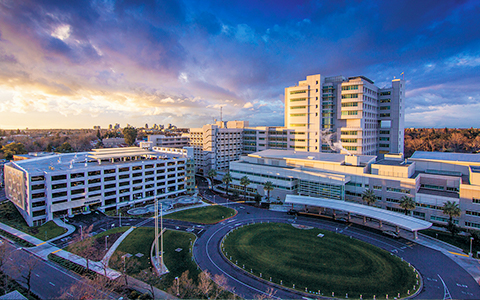General Psychiatry ResidencyWhy train at UC Davis?
A welcome message from our chief residents
As chief residents, we are passionate about our program and excited to introduce you to it. In talking to our co-residents, here are some key reasons why we have loved our training at UC Davis:
Please read the rest of our message below for our take on “Why train at UC Davis?”
Warmly,
Barb Ekeh (PGY-4), Senior Chief Resident
Thadeus Odom (PGY-3), Associate Chief Resident
Emma Zavala-Suarez (PGY-3), Associate Chief Resident
1. The culture
The UC Davis General Psychiatry Residency provides the best of both worlds as an academic program with a focus on community psychiatry. We recruit passionate, supportive residents and faculty from diverse backgrounds who are driven to improve mental health care at all levels of the system. We have a culture of regular open dialogue between residents, faculty, and administration which helps our program continually grow and improve. The end result is a group of residents who are prepared to excel clinically and expertly navigate complex mental health systems.
2. Commitment to health equity
Promoting health equity at a systems level starts with recruiting a diverse workforce of faculty and residents. We are proud of our holistic review of applicants, in which no applications are cut off due to test scores, grades, or international status, and we account for distance traveled. Once they join UC Davis Psychiatry, our residents benefit from mentorship from a diverse group of faculty who have buy-in from the highest levels of the department towards diversity, equity and inclusion efforts. Because our commitment to health equity is woven throughout the program from the top down, residents receive robust cultural psychiatry training throughout all four years of training and learn to incorporate discussions of structural racism and the role of bias in their daily clinical work.
3. Diverse clinical training
PGY-1 year is marked with 6 blocks of a variety of psychiatry rotations, including jail psychiatric services and psychiatry consults, and 6 blocks of “off-service” rotations, including two months of neurology and one month of primary care in a federally qualified health center.
Residents interested in Child and Adolescent Psychiatry have the opportunity to complete a month of Peds EM or Peds wards instead of adult EM.
The majority of PGY-2 year is spent in community psychiatry settings, with 3 months of outpatient exposure at the Adult Psychiatric Support Services (APSS) and inpatient rotations at the Sacramento County Mental Health Treatment Center (SCMHTC). SCMHTC is the safety net psychiatric facility for Sacramento County, so residents become highly skilled at managing severe mental illness in a particularly vulnerable population.
Residents also have a year long half-day longitudinal clinic and one month of elective time for early career exploration. Popular options include longitudinal rotations at nationally renowned sites such as the county’s Early Psychosis clinic (SacEDAPT) or the MIND institute for developmental disorders, as well as a forensic psychiatry elective for those considering a fellowship at UC Davis, one of the best forensic psychiatry programs in the country.
The entirety of PGY-3 year is spent in the Behavioral Health Center for outpatient psychiatry training. Residents benefit from 3-4 hours of supervision weekly as they manage their own panel of adult and child patients, including 3-5 psychotherapy patients of their choosing. They also have a protected half day for administrative work and charting. Another half day is reserved for a longitudinal specialty clinic, such as Women’s Mental Health or the opportunity to lead trauma-focused group therapy in RESTART clinic.
The fourth and final year is used for career exploration and gaining comfort in the acting attending role on various core psychiatry rotations. Popular elective options include interventional psychiatry at Kaiser and Mindful Health Solutions, as well as intensive outpatient and partial hospitalization programs at Sutter Health. Many residents who stay in Sacramento end up working either at UC Davis or the same sites throughout the community that they have rotated through during their training.
4. Protected time for leadership, research, resident wellness
UC Davis Psychiatry provides extensive protected time for residents in order to best support their professional development. Early in residency, residents may apply for a Research track or the Global Mental Health track. The research track includes close mentorship, a protected weekly half day and the option for extended training for 100% protected time. The Global Mental Health track is for research, clinical, or advocacy work at a local or global scale. This track includes some project funding, a protected weekly half day, close mentorship, and protected elective time in second and fourth year. In 2022, the department also started the Tupin Resident Scholars Program, in which residents receive targeted mentorship and project funding to pursue clinical questions related to the department that can be answered with health services or clinical research. Last but not least, in their fourth year, residents may pursue additional psychotherapy training with the Psychoanalytic Psychotherapy Training Program based in San Francisco (but now virtual).
UC Davis residents are also encouraged to pursue nationally recognized fellowships while in residency. We regularly have SAMHSA Minority fellows, APA Child and Adolescent fellows, and APA Public Psychiatry fellows. Our cohort includes a recipient of the Rappeport fellowship, a prestigious award for residents pursuing additional forensic psychiatry mentorship.
The program’s call schedule is relatively light. Interns have 7 weekends of day call combined of the VA and the consult/ED services, then increasingly light day call burdens with each year of training. PGY-2s and -3s have about 22 nights of home pager call, and PGY-4s have no weekend day call and approximately 10 nights of home call. There is no in house overnight call, nor any 24 hour call days at any point in categorical training.
UC Davis values protected time and funds for resident wellness and personal growth. UC Davis is one of the few remaining psychiatry programs to offer process groups for residents, and residents have the option to use the time for individual therapy instead. All UC Davis residents have two protected Wellness half-days in addition to their sick leave. The department also provides funding for monthly wellness events just for residents, crucial for strong intra-class bonding.
5. Sacramento Living
Residents love Sacramento for its big city amenities with a small city feel and a diverse population, surrounded by the best outdoor recreation opportunities northern California has to offer. Residents often spend their free time climbing together in the local gyms or trying the many delicious farm-to-table restaurants in the city. Weekends include wine-tasting in the foothills, paddle-boarding along Lake Natoma, or biking along the American River Bike Trail. Just a couple hours’ drive away residents can explore Lake Tahoe or visit San Francisco, and Yosemite is only a four hour drive from Sacramento. The year-long sunny weather and cooling delta breeze allows for year-round activities, but if you need to leave the Sacramento airport is small enough to be easy to use but large enough for any direct cross country flights.
Sacramento is also significantly more affordable than other large California cities, which allows residents to travel, live comfortably, and even buy a home. Funds include competitive pay, a housing stipend, an education fund, a yearly local allowance, and relocation funds. Residents also love the meal money for all the farm-to-table meals and gourmet snacks they can get from the cafeteria.


